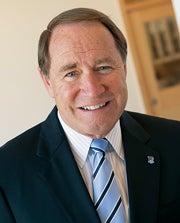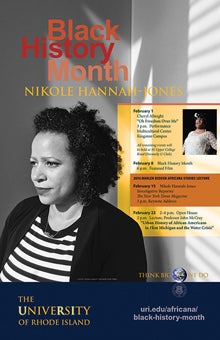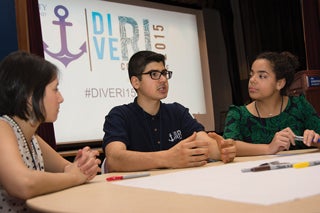President’s View

Building a community at URI that values and embraces equity and diversity is one of the four transformational goals we set forth in the 2009–10 academic year. Five years later, we reported on our progress toward these goals—you can explore the report here: uri.edu/president.
Under the leadership of Naomi R. Thompson, our first associate vice president for community, equity and diversity, we have found many ways to demonstrate that diversity is essential to our culture and is a core value of our community.
Nowhere is this more evident than in the efforts our students have initiated. One of the most striking of these student-led activities is a conference that started last spring. The Rhode Island Diversifying Individuals Via Education conference (D.I.V.E. RI) promotes intercultural competence and inclusion on Rhode Island campuses through workshops and discussions focused on racial and ethnic identity. By prompting conversations among student leaders, D.I.V.E. RI hopes to create and sustain connections among these students, who can then identify and help to address issues of institutional inequity.

Around the same time that this issue of QuadAngles arrives in your mailboxes, the University will be hosting our second annual D.I.V.E. RI conference.
Student organizers describe last year’s inaugural event as an opportunity to talk about issues that are not typically spoken about in the classroom. Twenty-one workshops facilitated by students, alumni, staff, URI faculty and community partners included topics like Equity Through Access: Increasing the Potential for Minority Success in Majority Settings and Blacklisted: The Influence of Racial Bias on Higher Education. Participants also heard from keynote speaker Marc Lamont Hill, who challenged them to start meaningful change through their own our day-to-day interactions. Dr. Hill spoke about “the world that is not yet,” emphasizing that there is still a great deal of work to be done in the diversity arena.

At a time when our country has seen an escalation of protests on college and university campuses from the University of Missouri and Yale to the University of Michigan, Colgate and Ithaca College, we recognize and appreciate D.I.V.E. RI and other URI programs that strive to identify and meet the challenges of creating an inclusive and diverse campus culture. For example, our Talent Development Program, nearing its 50th anniversary, has been one of the most successful paths to diversity at URI. From a class of 13 students in 1968, TD has grown to more than 1,300 current students and 1,600 graduates. Overall, students of color and international students represent nearly 21 percent of all students. And faculty diversity has increased from 10.6 percent to 15 percent during the past five years. But, to echo Dr. Hill, there is still work to be done.
In the fall of 2015, after convening campus leaders to discuss ways to create more supportive campus environments, Secretary of Education Arne Duncan noted that “Cultural competency is a core message that colleges and universities should be teaching (and learning) as a foundational component of what it means to be an educated American.” He also pointed out, “Students can serve as experts on their lived experiences, helping to make colleges and universities safe spaces. But the campus and broader community must own the work.” At URI we are proud to own the work of D.I.V.E. RI, an initiative our students will undoubtedly take to new heights in 2016.
David M. Dooley
President, University of Rhode Island
 Home
Home Browse
Browse Close
Close Events
Events Maps
Maps Email
Email Brightspace
Brightspace eCampus
eCampus


